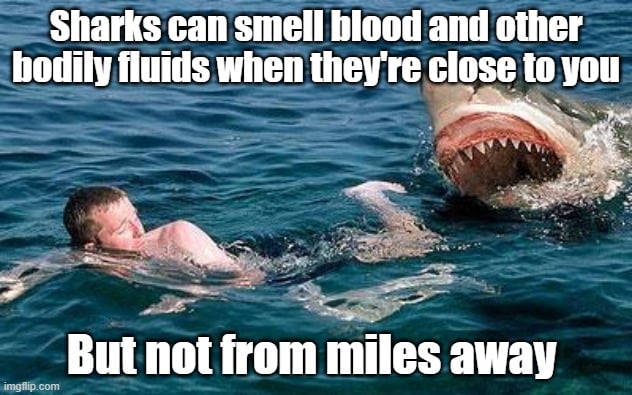Table of Contents (click to expand)
We’ve seen many times that sharks are attracted to blood, so the animals must be able to detect it using their senses: sight, taste, or smell. But can sharks actually distinguish between human blood and other blood?
Movies such as Jaws and the ludicrous Sharknado have ingrained in our minds that sharks are attracted to human blood. These bloodthirsty swimmers of the sea never pass on a chance to eat a human, at least according to Hollywood. But does this happen in real life? Or is it just a “reel life” phenomenon?
Recommended Video for you:
Frequency Of Shark Attacks On Humans
Media attention to shark attacks makes it seem like they happen a lot, but the frequency of shark attacks on humans is exceptionally low. From a global census, shark attacks on humans cause about ten deaths each year. Only about 7% of unprovoked shark bites resulted in death globally between 2000 and 2009. This roughly translates to 4.6 fatal bites per year.

Out of five hundred species of sharks, it was found that three sharks—the great white shark, the bull shark, and the tiger shark—were responsible for most of the attacks. They cause over 60% of all reported shark bites and 80% of the shark bites, resulting in casualties.
In contrast, a 2.8 mm (0.11 inches) mosquito kills approximately 700,000 people each year, and man’s best friend, the dog, kills over 50,000 people each year by spreading rabies.
Can Sharks Smell Human Blood?
Contrary to what Jaws might say, sharks are not attracted to human blood. However, they can’t sniff out one drop of blood from miles away. Blood and factors like disturbances in the water can be a possible pull for sharks. This is how sharks detect fish or marine mammals.
The chances of sharks being attracted to human blood or any other body fluid are much lower.
An Experiment By ex-NASA Engineer
Mark Rober, an ex-NASA engineer and now a science YouTuber, conducted an interesting set of experiments to test whether sharks prefer human blood or fish blood. He attached pumping devices filled with either cow blood (which mimics human blood), fish blood (tuna fish), or seawater to three surfboards and then released them into the ocean. The pumping devices would release the fluid into the water as they moved. Over an hour, with the help of a drone, they observed the number of shark visits to each surfboard.
They witnessed 0 shark visits to the surfboard with seawater, eight shark visits to the one pumping out cow blood, and a monumental 134 visits to the surfboard with fish blood. However, this can only be taken as an anecdotal academic reference and is not a complete analysis.

A study published in 1963 found similar results. In a test pond, they exposed sharks to fish blood, fresh and decomposing human blood, and human sweat and urine. The sharks swarmed around the fish blood, especially tuna blood. The sharks in the study were attracted to human blood, but inconsistently and less strongly than fish blood, and were outright repulsed by old decomposing blood. As for sweat and urine, these substances did little to attract the shark.
However, for a shark to detect these from miles away, the fluid must be strong enough to not be diluted by the enormous amount of water around it. One drop of blood in flowing water would be diluted from 10-6 to 10-21 in the space of one kilometer. That’s as good as the drop never having existed.
Some sharks have reportedly swum past other people to seek out a particular individual or a group of swimmers or divers. That one swimmer might have a stronger body odor than others. But, for this, the concentration of odor molecules in the water must be very high.
A more plausible explanation is that sharks are more attracted to one person’s activities—like thrashing about in the water—than their body odors.
What About Menstrual Blood?
So, if any body fluid in a large enough amount and concentration might attract a shark, what about when a person is menstruating? Is that any different?

There is no positive evidence of menstrual blood leading to shark attacks. The chances of menstrual blood releasing in the water are low, as the pressure of the water while swimming or diving will temporarily stop one’s menstrual blood flow.
Sharks also do not have any preference for males over females or vice versa. Previous data might suggest that more men are attacked, but that was only because more men were present in water activities than women.
Can Sound Attract A Shark?
We have seen how smell can attract sharks, but does sound have any role to play?
Sound is the main cue for a shark to move into an area. However, once a sound is registered and it starts moving towards the source, a shark will rely more on sight than sound.
Sharks are attracted to low-level frequency sounds, especially in the range of 10-50Hz. This is the frequency that a struggling or injured fish also releases. Tests have concluded that sharks are most sensitive to 40 Hz and 800 Hz frequencies. They use their lateral line sense organ and inner ears to locate their prey from 250 meters away or more.

A Final Word
As mentioned above, only a handful of shark species are involved in attacks on humans. Sharks evolved millions of years before humans appeared. Their usual prey includes marine animals, such as fish or seals. Humans are not part of a shark’s diet, so it seems logical that they don’t have much of a taste for us.
If you’re ever out in the ocean, swimming or diving, there is a minuscule chance of you being attacked by a shark and dying unless you’re already bleeding. Meanwhile, you can learn more about what makes shark eggs different than other eggs by clicking here!
References (click to expand)
- Fun Facts About Shocking Sharks | NOAA Fisheries.
- Do sharks hunt people? - NOAA's National Ocean Service.
- Menstruation and Sharks – International Shark Attack File.
- Shark Attack Theories.
- Simpfendorfer, C. A., Heupel, M. R., & Kendal, D. (2021, July 23). Complex Human-Shark Conflicts Confound Conservation Action. Frontiers in Conservation Science. Frontiers Media SA.
- Tester AL. 1963. The role of olfaction in shark predation. Pac Sci 17(2): 145-170.












